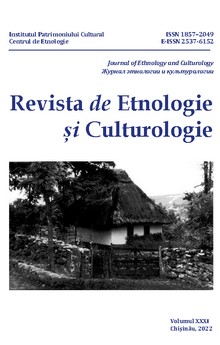ACȚIUNILE AUTORITĂȚILOR DIN MOLDOVA SOVIETICĂ PRIVIND CULTURA TRADIȚIONALĂ (ANII ʼ40 AI SEC. XX)
ACTIONS OF THE SOVIET MOLDOVAN AUTHORITIES IN RELATION TO TRADITIONAL CULTURE (1940S)
Author(s): Valentina UrsuSubject(s): Political history, Government/Political systems, Culture and social structure , WW II and following years (1940 - 1949), History of Communism
Published by: Institutul Patrimoniului Cultural al Academiei de Științe a Moldovei
Keywords: Culture; tradition; heritage; socialism; ideology;
Summary/Abstract: This article is devoted to the mechanisms of influence used by the Soviet authorities in the early years of the Soviet occupation of Bessarabia for the depreciation and rejection of the ancestral cultural heritage and the establishment of new ways of life. In the 40-s. XXth the governing bodies of the CPSU and the PCM adopt numerous directives and provisions aimed at establishing new mechanisms of influence on all inhabitants of the Moldovan SSR, regardless of ethnic characteristics, language, customs, traditions, holidays. All secular history is forgotten. In order to compare the accuracy of historical documents and the statements of the Soviet press, a comparison is made with the situation that existed in our lands during the years 1918–1940 when Bessarabia was part of Romania. Under the new Soviet regime, traditional culture was considered a legacy of the past that could not be preserved in a new society. A vehement campaign is undertaken on the history, the Romanian language, the monuments of history and culture, the traditional way of life, imposing new ways of cultural expression that would glorify and support the Soviet system.
Journal: Revista de Etnologie şi Culturologie
- Issue Year: XXXI/2022
- Issue No: 1
- Page Range: 84-91
- Page Count: 8
- Language: Romanian

